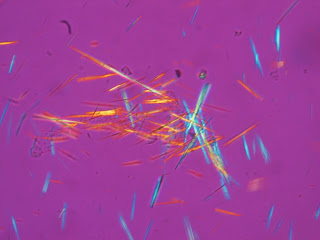 |
| From Wikipedia |
Further, as it was more common with diets high in meat products, alcohol, obesity, insulin resistance and kidney disease, it was also advisable to treat these conditions as well.
And this is largely how I still treat gout.
However, I don't remember ever being taught (or myself asking) why we develop these uric acid crystals in the first place. In fact, humans are one of the very few organisms that develop uric acid crystals, or uric acid kidney stones or deposits of uric acid in joints, called typhi. Most other organisms have an enzyme called uricase, which destroys the uric acid, and thus they never have to worry about this condition.
In fact, this uricase enzyme in humans has been effectively disabled by genetic mutations. Why? Many scientists think that there may be many reasons for this. Uric acid is a very strong anti-oxidant, and it may be beneficial in reducing reactive oxygen species (ROS) that can damage cells and cause premature aging. It also offers neuroprotection. Other scientists believe that at one time humans lived in a very low salt environment, and they adapted to this environment by disabling the uricase enzyme. This allowed humans to increase their production of uric acid, which allowed them to gently increase their blood pressure without the use of salt.
However, place these humans in areas with highly processed foods, high in calories and animal proteins, and environments prone to kidney disease (i.e., hypertension, diabetes, smoking), then they will under-excrete the uric acid. Indeed, gout was once referred to as the "disease of the kings" because only the rich could afford meals high in purines such as animal protein and alcohol, particularly wine. Now, however, gout affects 4% of Americans and has doubled in incidence from the 1960s to the 1990s. Further high uric acid levels (without actual gout) affect 20% of Americans.
Thus, maybe gout isn't a medical problem of the body, but rather ourselves and our culture not obeying the laws of the body. Maybe the body is trying to tell us to eat a low salt diet, drink plenty of water, and limit its intake of purine rich foods. Maybe we should listen to our body instead of constantly trying to "correct" its "mistakes."
No comments:
Post a Comment